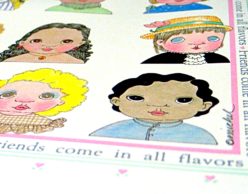Helen Fisher: Attraction Is (Almost) Colorblind

Helen Fisher studies the brain on love, and in love. She is a biological anthropologist, professor, chief scientific advisor at Match.com, and a global authority on love and desire. She has written five books, including Why Him? Why Her? Finding Real Love By Understanding Your Personality Type and The Anatomy of Love and her TED talks have been viewed close to 8 million times. The Mash-Up Americans caught up Helen to discuss the changing landscape of attraction, why we date who we do, and what it takes to have a successful mash-up marriage. Hint: It has to do with accepting bubbe meise and being cool with miso soup for breakfast.
How important is religion or race or ethnicity when it comes to attraction?
Only 40 percent of women and 30 percent of men say it is very important to them to have a partner of the same ethnic group. 40 percent of women and 30 percent of women say it is very important to be with someone of the same religious background. What do they really want? 95 percent of both genders say they want someone who respects them, someone they can trust and confide in, someone who makes them laugh, someone who makes enough time for them. Last on the list is someone they feel sexually attracted to. Bottom line is, racism is really declining when it comes to attraction.
Why is that?
Younger people are just plain old used to diversity. First of all we’re seeing all different kinds of people on television. We’re sitting in French class next to a girl from Mongolia and a boy from Chile, and we’re getting to know them as people. Basically the human brain is exactly the same from race to race. The more we experience, the more we understand that.
People married to please god, community, family. Nowadays, people marry to please themselves.
That number used to be 100 percent. Throughout our agrarian farming tradition, 10,000 years of it, we had to marry the right person, the right clan, the right family, the right religious background, the right political connections, and hopefully all of that existed on the farm next door. People married to please god, they married to please the community, and they married to please the extended family. Since the industrial revolution, we’ve increasingly seen people marry for love, and that’s escalated since World War I. Nowadays, people marry to please themselves.
Will that number ever go down to zero? So that religious or ethnic differences don’t matter at all in attraction?
It might not ever go down to zero, because there’s always going to be some people that want that. All of the psychological studies show you do tend to marry someone of the same socioeconomic background, same general level of intelligence, same level of attractiveness, and same religious and social values, because that’s largely who you know. But as we’re marrying later, you get less of that. If you marry in college, you’re going to meet people just like you. But the further you get into the workplace and farther you get from home, the more likely you’re going to meet people from different parts of the world. Where did you meet your husband?
We actually were friends in college, but we didn’t get married until we were in our early thirties.
I bet you have a beautiful child.
He’s so gorgeous! I won’t deny it!
They call that heterosis. It’s an anthropological term for marrying out and mixing genes from different populations. It strengthens the face. [Editor’s note: Mash-up babies are the cutest. Science.]
Is attraction based in science?
Attraction is both cultural and biological. In Why Him? Why Her? I write about the biology of mate choice. You are naturally drawn to someone from the same ethnic and socioeconomic background, with the same reproductive goals, but you can walk into a room and everybody has those. So why one person over another? Certain personality types are attracted to each other. A high dopamine person, who has a lot of that hormone, who’s an explorer, independent, and curious, will look for another high dopamine person. Whereas a high testosterone person, who is analytical, competitive, and strategic, will be attracted to their opposite. That’s biology. Then there’s your love map, which is cultural. It’s your unconscious list of qualities you’re looking for based on your personal history and experiences.
What about things like fetishes? We see that as the ugly side of mash-up attraction. Like, white men who only date Asian women. Is there any science behind that kind of ethnic or racial attraction?
First of all, Asians are good looking! But it’s almost purely cultural. Maybe some of these white men with Asian fetishes, the cutest girl in the third grade was Asian and she was sweet and charming and they think all Asians are that way.
In the U.S., with our strong immigrant history, we obviously have hundreds of different cultures that bump up against each other. Does that shape who we’re attracted to, and why?
Well, it’s the smart ones that got there, they broke all the rules. When people immigrate, it’s not the lowest of the low that immigrates. The lowest of the low doesn’t go anywhere. They don’t have the courage and daring or the creativity. People who immigrate are those who are coming with a whole lot of skills and you can see that. They get over here and they’re cleaning our houses but their children are becoming doctors, and we shouldn’t be surprised. The human brain has not changed in 200,000 years. Those with daring and intelligence will be attractive, regardless of race.
Well, it’s the smart ones that got there, they broke all the rules.
A little while ago, I was dating a man who was the president of a huge, major American cultural institute. I was about to go on television for an appearance, and the techie who was getting me ready was this middle-aged black guy. He was so much smarter than that president. He was so much less boring than that president. He knew all about human reproductive strategies and the brain; he read a lot. The president couldn’t talk about anything except golf.
I hope you got rid of that guy.
I did. Ugh. Golf.
Did you date the techie?
He was married. Oh, but that other guy, he was the head of this great institution and his other great love was that skating thing. Hockey. Christ Almighty, I had to go hockey games! The techie would have taken me to Shakespeare.
Other than avoiding hockey, do you have any strategies for a successful mash-up marriage?
There are questions anybody should ask before they get married: Are we having kids? Where are we going to live? Who is going to support whom?
After the obvious ones, then it’s how are we going to raise our children? What religion will we raise them in? What language will we speak to them? What holidays will we celebrate? What kinds of schools will we send them to? After you get through the kids, there’s the parents. Elderly parents moving in to your home is not an American thing. It used to be American. But it’s not American now. We expect our parents to live alone and after their partner dies, start to court and have sex and use Viagra. Don’t bother us except at Christmas! But that’s a real issue between many couples of different cultures.
When you marry someone of a different culture, it’s often the little things that get you.
One strategy is to walk through the day and go over the basics, starting with breakfast. What are you going to do with this day? Are grandparents cooking breakfast? Who is cooking? What is appropriate breakfast? What do you regard as healthy food, or appropriate food? What time of day are we going to eat? After breakfast, who leaves home for the workforce? Is it okay to put the child in daycare or does it have to be a family member? What role is the woman supposed to play? The man? And on through the day.
What are the biggest obstacles to a lasting, happy mash-up marriage?
By the time you’ve married to someone of a different background, you have already answered the big questions. When you marry someone of a different culture, it’s often the little things that get you. My twin sister lives in France and is married to a French man. One of the big issues in their relationship is a draft.
A draft?
She wants to open the windows in the summer for a breeze. And the French are absolutely convinced that a draft will kill you. Absolutely convinced of it! [Editor’s note: Bubbe meise.] So he thinks she’s trying to murder him, and all of their arguments are about a draft. This is not what they discussed before they walked down the aisle. They discussed the big issues. But it’s the little ones that can be a real problem when you’re with someone from another background.
Will those little things eventually kill a relationship? Is it death by a thousand tiny cuts?
They could. But we’ve studied the brains of happily married people. And one of the things that makes a happy marriage is the ability to overlook the things that you don’t like and focus on what you do. It’s called positive illusion. It’s the simple ability to ignore what you don’t like about somebody. So whether those things will be a thousand little cuts or a thousand opportunities to say, “Okay, I don’t mind this that much because I really love this person,” is up to you.




![[Image Description: Photo of a Black woman smiling into the camera. She has shoulder-length brown hair with gold highlights, and is wearing red lipstick and a purple shirt with a zig-zag pattern. The sunlight is shining on the side of her face.] Photo Credit: Andrea Scher](https://www.mashupamericans.com/wp-content/uploads/2021/02/Standard-New-Site-Feature-Image-Size-1140-x-400-2-248x194.jpg)
